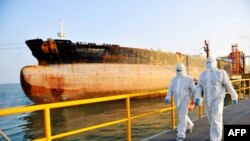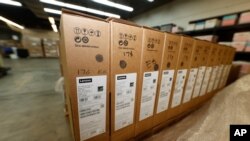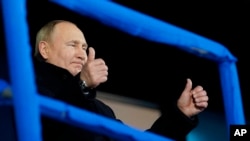As the world's biggest trader and buyer of crude oil, China has been hit hard by the economic sanctions unleashed on Russia over its invasion of Ukraine. Even Chinese government officials have begun to predict economic difficulties on the horizon.
"This year, the pressure on foreign trade will be huge, and the situation will be very severe," Commerce Minister Wang Wentao said at a recent press conference.
The current sanctions regime has pushed up the price of crude oil. This will result in a heavy financial burden on China, which is the world's biggest oil importer. The economic restrictions may also affect the $147 billion annual trade between China and Russia. Fund transfers to Russian entities can no longer occur in U.S. dollars, the currency of choice for 86% of international transactions.
"Chinese firms are caught between a rock and a hard place," Jacob Gunter, senior analyst at the Berlin-based Mercator Institute for China Studies, told VOA.
Chinese companies with operations in the U.S. or the European Union may fall victim to secondary effects of the sanctions if parent corporations in China maintain business links with Russia, he said.
Two Chinese firms, Lenovo and Didi, which recently announced plans to cease doing business in Russia, faced a storm of ridicule and criticism on Chinese social media for "pandering to American whims." This has caused a lot of concern among dozens of Chinese firms, which fear losing the domestic market if they cut ties with Russia.
Energy imports constitute two-thirds of China's purchases from Russia. For now, the ban on Russia-related SWIFT fund transfers does not affect energy payments. This safeguard primarily shields European countries that are heavily dependent on Russian gas supplies, but it will also protect Chinese energy-related transactions. SWIFT, which stands for Society for Worldwide Interbank Financial Telecommunication, is an international bank-to-bank transfer system.
Some experts also predict China will end up importing inflation. The prices of many imported commodities have risen since the Russian invasion, said Mark Williams, chief Asia economist for Capital Economics.
"If the situation escalates further and energy trade between Russia and the West is cut off, then the impact would be even larger," he said.
On the other hand, Williams said, the war offers some economic opportunities for China.
"With much of the world cutting off ties with Russia, China is in a strong position to negotiate long-run energy supply contracts on favorable terms. Meanwhile, bans on Western exports of certain goods may allow some Chinese suppliers to take their place instead," he said.
An important question is whether Beijing will stick to its recent deal with Russia for enhanced trade, including expanded purchases of Russian gas. Russian President Vladimir Putin signed the agreement February 4, the opening day of the Winter Olympics, during a visit to Beijing.
"I think Beijing is frustrated by Russia's actions in Ukraine so soon after the deal, but it is unlikely to walk away from it," Gunter said, adding that although China will become a crucial lifeline for Russia, there are limitations to the extent Beijing can offer support without drawing the ire of the West.
Besides, demand for energy, one of Russia's most important exports, cannot increase significantly in the short term, because importing quantities of Russian gas in excess of what has been contracted will require additional pipeline facilities, which take time to build.
China has for years been trying to reduce its dependence on U.S. dollars and has signed currency swap agreements with several trading partners, including Russia. In 2015, Beijing launched the Cross-Border Interbank Payment System, an international yuan payment and clearing system, as an alternative to SWIFT.
"It remains to be seen how CIPS will work and if it could act as a possible 'competitor' for the SWIFT," Lourdes Casanova, director of the Emerging Markets Institute at Cornell University, told VOA.
The CIPS system may not be entirely immune to U.S. intervention if it is used by China for transactions with countries other than Russia, said Williams of Capital Economics. At present, 17 Russian banks are connected to the CIPS system.
"It is also subject to Western sanctions on transactions involving Russian banks," he said. "While the CIPS payments system doesn't touch the U.S. banking system, payments through it that were deemed to be intended to circumvent U.S. sanctions could trigger sanctions for those involved. That effectively limits the use of CIPS to bilateral transactions between Russia and China."


